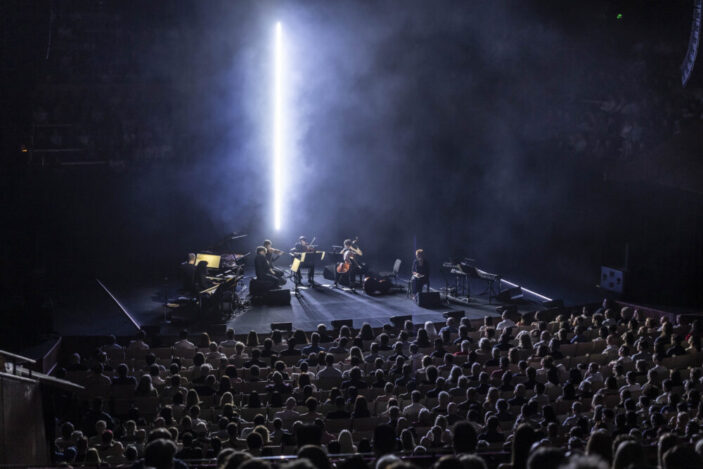
Max Richter is less interested in your Pre-Frontal Cortex as he is in your limbic system, hippocampus and amygdala. The postminimalist piano man is as much a neuroscientist as a musician, taking a scatter shot for the subconscious with dreamy, evocative classical music designed to destroy and rebuild.
Max Richter is my most trusted travel companion. My confidant. My guide. His deeply meditative works first touched my heart and soul through the most underrated TV show in history, HBO’s three-season, three-peat masterpiece, The Leftovers – a triumph of trauma-based screenwriting, where LOST writer Damon Lindelof used author Tom Poretta’s odd conceit as a way to explore grief, faith, healing, hurt and anger.
Max Richter brings melancholy and regret. And for that, I hate his music. But he’s also a magician, creating foolproof, plug-and-play tools for you to use to make life’s moments feel that much more special, to resonate deeply, to form robust and visit memories, and add a cinematic quality to virtually anything. For that, I love his music.
I first finished The Leftovers in June 2017, the final scene gift-wrapping the cathartic story of love, loss and longing in the most satisfying way (a rarity for any TV show that isn’t Breaking Bad). Max Richter’s compositions haven’t left my ears since. These motifs are pockets to me. Sturdy, intangible and profound ways to store memories and stick them to each and every note.
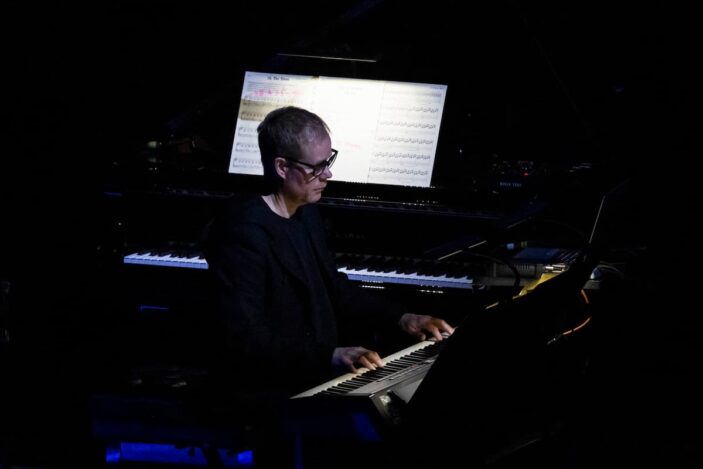
Tools like “She Remembers” and “Dona nobis pacem 2” can be used to heighten moments and encourage a more efficient encoding and retrieval process for your working memory. Throw on any one of these songs and your mind is taken away from the present, restfully floating over the memories you’ve chosen to store inside.
So it’s little surprise that Max Richter, a man who speaks to your subconscious via the greatest language of them all, has a cerebral performance called Sleep. The idea of it is simple. He plays to you, for almost eight hours, while you sleep, taking advantage of your conscious brain’s absence by cooing to the part that yearns to be seen. To part that’s much, much more important.
But Sleep isn’t something I can write much about. I’ve missed it by a matter of days on three separate occasions. In fact, I’ve missed Max Richter by days or weeks on five separate occasions, in various cities around the world. And so, knowing the personal importance of Richter’s music, you can imagine how excited I am when I file into the Sydney Opera House’s Concert Hall and take my seat to watch the soul-stirring maestro on his very first world tour.
Richter is here to perform a new show split into two, the first half covering his latest album, last year’s characteristically brilliant In A Landscape, and the second half giving life to his highly conceptual The Blue Notebooks.
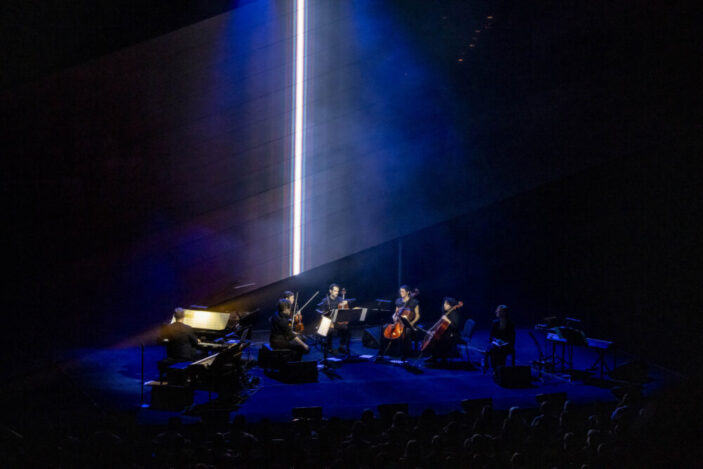
As the musician himself notes, his works are about “reconciling polarities,” exploring both the inner and outer landscapes by pulling together various forms of expressions and sounds, from field recordings and electronics to more traditional classical music.
And so selections from In A Landscape showcase Richter’s visionary approach to post-classical ambient music. Footsteps shuffle before each piece begins, field recordings that flutter around the Concert Hall’s hi-fidelity ceiling and add a weighty, earthy dimension to Richter’s spiritual scores like “Vladimir’s Blues” and “The Poetry of Earth.”
That was all fine. In fact, the only thing that felt off about the set was the odd stage dressing, symbolised by one tall, narrow beam that changed colours based on the composition. A bit like a mood ring. While I’m still not sure what the purpose of the simple set-up was, it’s hard to believe most people would stay present enough throughout the gig for any aesthetics to really land.
Not to say it’s boring.
But to say Max Richter’s music is a lovely way to travel. His music draws you into your head, but that’s not as scary as it sounds. I look around the Concert Hall and see many people fighting tears and shaking to the particular echoes of their own memories. I wonder where this music takes them. Me? I’m on a rocky outcrop in Portland, Maine. But I’m also slowly walking down the deeply contemplative alleyways of Tokyo and climbing the woodsy mountains of Squamish. I’m free in a way that I’ve never felt in Sydney.
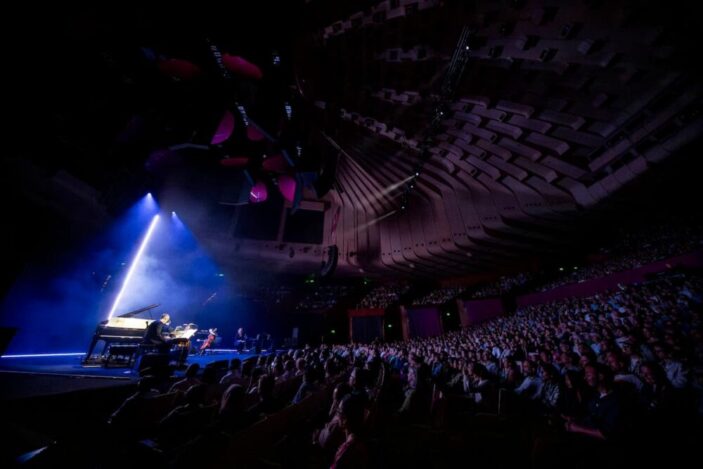
The woman in front of me takes a tissue and dabs her cheeks. What has she tied this song to? Similarly I start to look around, many people have their eyes closed. Are they present or has this music drawn them deeper into themselves?
Max Richter is as much a spiritual guide as a therapist performing EDMR on a patient. His music is a sanctuary for the broken, and so it should be delivered with precision and delicacy, two things the accompanying American Contemporary Music Ensemble handles exceptionally well as it works in concert with Richter’s highly focused material.
The emotions intensify once Richter moves towards The Blue Notebooks. The original album is defined by Tilda Swinton’s beautifully postured reading voice as she recites passages from Czeslaw Milosz’s Hymn of the Pearl and Frank Kafka’s The Blue Octavo Notebooks.
Yet Swinton is hardly missed for the performance, instead replaced by Eryn Jean Norvill who enunciates each text perfectly, timed to smoothly roll into the controlled chaos of synths, piano and string arrangements that are quickly given form by Richter’s steadfast direction, the man shifting mainly between organ, laptop and grand piano.
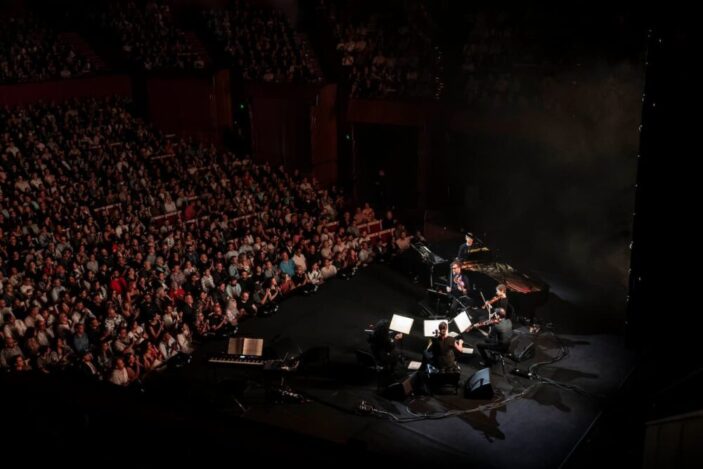
Richter’s most moving motif, On the Nature of Daylight, introduced the audience to The Blue Notebooks and immediately set the tone, featuring more intricate forms built into immovable walls and thrilling crescendos. This approach to building staggeringly simple and fragile soundscapes is best expressed by set-closing The Trees, hinged on Richter’s flair for hushed drama.
Richter’s music relies on its familiarity, even for those who’ve never heard it. There’s a certain tinge of universal nostalgia that this masterful composer has found, distilled, and constantly uses to draw his audience into his music and guide them as they explore their own emotional selves. It is a wholly effective and arresting style that has earned Richter applause from both the hardcore classical and casual crowds.
That all comes across brilliant live, quietly aching and echoing around the refined acoustics of the Concert Hall. It’s magical to witness the meeting of electronic and organic as Richter explores “polarities” but the real brilliance of his uncomplicated music is how it makes you feel.
And the beauty of Max Richter’s music is that he isn’t telling you how to feel. He’s just inviting you to feel. That’s the irrevocable value of largely wordless ambient and classical music.
![]()
![]()
![]()
![]()
![]()
FIVE STARS (OUT OF FIVE)
The author based this piece on Max Richter’s live performance at Sydney Opera House on 15th February, 2025.
All photos credited to Ken Leanfore for Sydney Opera House.
